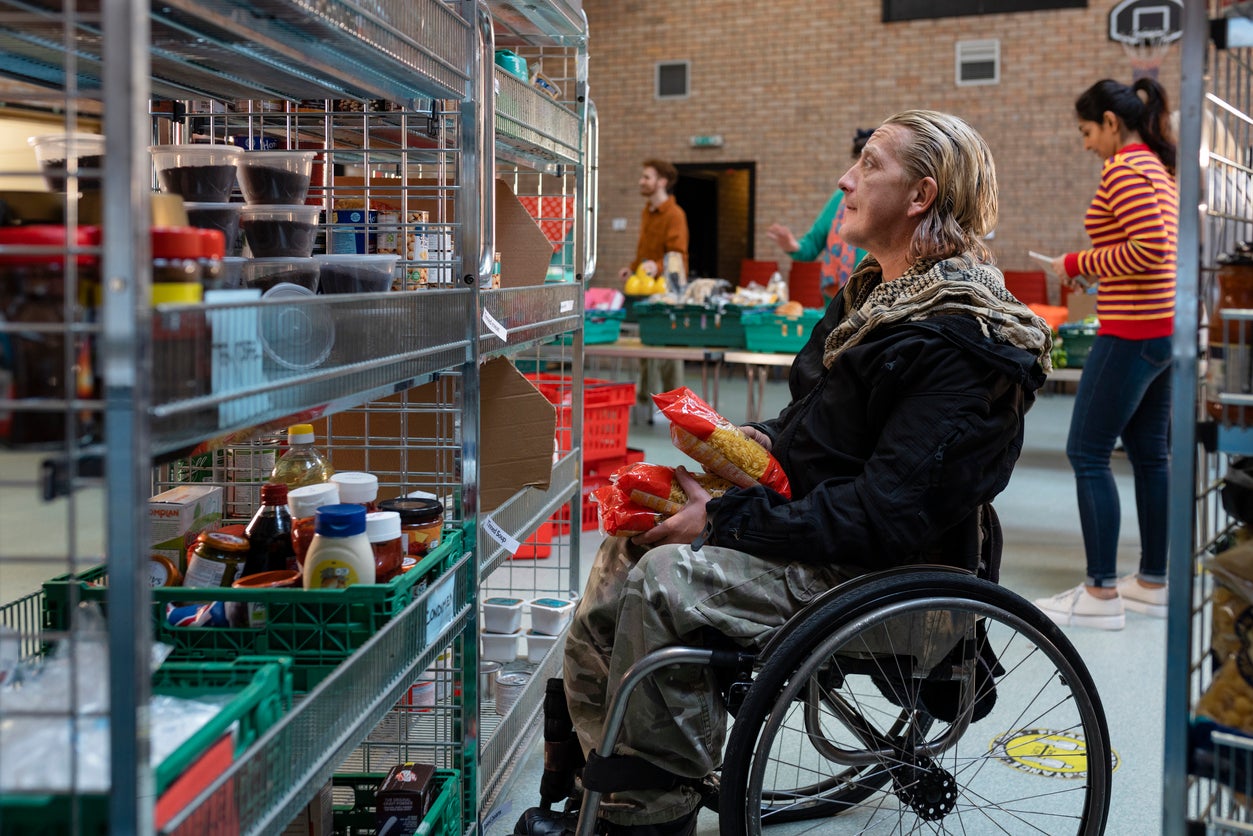Food banks struggle with ‘tsunami of need’ as donations drop
Exclusive: 91 per cent of food banks see rise in demand, while 69 per cent hit by donation slump
Food bank managers have warned Rishi Sunak’s government that a “tsunami of need” could see them forced to turn hungry families away, as donations fall while demand continues to rise in the face of the cost of living crisis.
Volunteers told The Independent they are exhausted, and scared of what the new year will bring, as they struggle with a fall in donations combined with a fresh surge of people in need of help.
A survey by the Independent Food Aid Network (Ifan) – a network of 550 groups across the UK – found that 91 per cent of food banks had seen greater demand this winter compared with last year.
The data from the survey, shared with The Independent, also showed that 69 per cent of food banks had seen a fall in food and cash donations. Almost half – 46 per cent – are worried about whether they have the capacity to support people in 2023.
Soaring energy bills, higher food prices, and wages falling behind inflation mean November’s cost of living support payments provided little respite from the rise in demand, according to food bank chiefs.
Kathy Bland, who runs the Leominster Food Bank in Herefordshire, said the number of parcels given out this year was double the number distributed in 2021.
She said a fresh “tsunami of need” was under way this winter – with Age UK referring more elderly people struggling with energy bills and supermarket prices than ever before.
“People are cold, hungry, and desperate,” said Ms Bland. “Our volunteers cannot keep up with this level of service, and I don’t believe we’ve seen the worst of this crisis yet. They are exhausted, and scared about how we can carry on if numbers continue to rise.”
Kate Brewster, of the One Can Trust in Buckinghamshire, said parents were “struggling to feed their children over the holidays”, adding: “January is likely to be difficult, some families will have been even more squeezed in the second half of December.”
Jen Coleman, manager at the Black Country Foodbank in Dudley, is also worried that the pressure will get even worse in the early months of next year. “So many people are facing debt and increased energy bills, while buying food is not an option,” she said.
Ifan’s November survey also found that 90 per cent of groups have seen a surge in new people coming to them for help, pulled into poverty by the cost of living crisis.
Benefits are set to rise by 10.1 per cent in April, which is close to the current rate of inflation, but food bank managers are not optimistic that it will be enough to cover soaring prices, bills and debt.
Many of those turning to charities for help are stuck in low-paid jobs, with unions warning that even some public sector workers are in desperate need.
Ifan called on Mr Sunak to offer more “cash first” support to boost the lowest incomes in January, as well as long-term action to increase both benefit payments and wages in line with inflation.

Sabine Goodwin, Ifan coordinator, said: “Seasonal donations and the distribution of emergency food parcels can’t solve this crisis – only raising incomes can. We cannot continue to normalise a crisis, volunteer-led response to entrenched and rapidly worsening poverty in our society.”
Ms Goodwin called for the government to “take responsibility for the policies driving Britain’s poverty epidemic”. She said: “However welcome the 10.1 per cent increase in benefits will be in April, it is likely to barely scratch the surface when it comes to reducing food insecurity and the clearly unsustainable pressure on charitable food aid providers.”
Some parents are so strapped for cash that they could not afford to buy their children any Christmas presents this year, food bank managers told The Independent.
“The cost of living is killing families,” said Billy McGranaghan, who runs Dad’s House. “Christmas is soul destroying because a lot of families can’t buy anything.”
One mother-of-two coming to Dad’s House for help said: “I wish – if I had money – I could buy a little bit of presents for my kids so they would be happy And for me too. I would buy a little gift I want.”
A government spokesperson pointed to the household support fund, which provides money to councils to help people in crisis, as well as the support offered through the energy price guarantee to those struggling to pay gas and electricity bills.
The spokesperson said: “The £650 worth of cost of living payments already made to millions of households are just part of £1,200 of direct help being given to those most in need, including £400 towards energy costs.
“The chancellor has also announced a further £900 will be paid to those on means-tested benefits in the next financial year, ensuring the most vulnerable continue to be supported.”





Join our commenting forum
Join thought-provoking conversations, follow other Independent readers and see their replies
0Comments